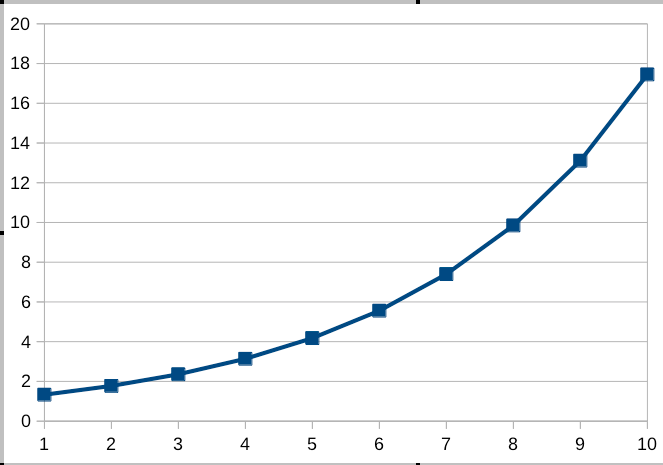“The number A is exponentially greater than the number B!” What does this mean? Nearly nothing. If it has a meaning, it’s that there’s some number x such that Bx = A. But that’s true of any two numbers, as long as they’re both greater than 1 and A > B. Please don’t use that expression in your writing.
You could also say that A is “linearly greater” or “quadratically greater” than B. They’re just as true and just as meaningless. “Exponentially greater” sounds more impressive because exponential curves rise really fast. In the early days of the coronavirus pandemic, the number of cases followed something close to an exponential curve. But a single data point doesn’t establish a curve.
What is an exponential function?
An exponential function is one of the form y = abx, where a and b are numbers that fit the curve. When it describes a real-life statistic, x is usually the time since some starting point. The rate of growth of an exponential function is proportional to the value of x. It not only grows fast, its rate of growth grows steadily. More precisely, its rate of growth is proportional to its value. If a quantity doubles every time a fixed amount of time passes, it’s following an exponential curve. Moore’s law, which said that the processing power of computers doubles every two years, gives an example of an exponential curve. Every real-life example of exponential growth (at least outside the realm of cosmology) eventually runs into limiting factors that change the curve to a different shape.
An exponential function looks like this:

Exponential growth isn’t a synonym for “fast growth.” A quantity which grows at a fixed rate, no matter how large, isn’t growing exponentially. The expression “A is exponentially greater than B” demonstrates mathematical ignorance. In one sense, it’s true for any two numbers that are greater than 1. There is some exponent x such that B = Ax. That’s not an exciting or informative fact.
An example of the stupid use of “exponential” occurs in yourdictionary.com (which I won’t honor with a link here). It claims, “The definition of exponentially is by great degrees or great amounts.” It goes on to misexplain: “An example of exponentially is how your income increases when it increases from $10,000 to $100,000.” Well, yes. The exponent is the log to the base 10,000 of 100,000, or 1.25. Here’s a convenient logarithm calculator if you want to figure it for yourself. If your income goes from $10,000 to $10,001, it likewise increases “exponentially,” with the exponent being 1.0000108568.
Writers who misuse “exponentially” to demonstrate their mathematical erudition, like the ones who toss around “algorithm” to demonstrate their knowledge of computational theory, only demonstrate their ignorance. Don’t be among them.